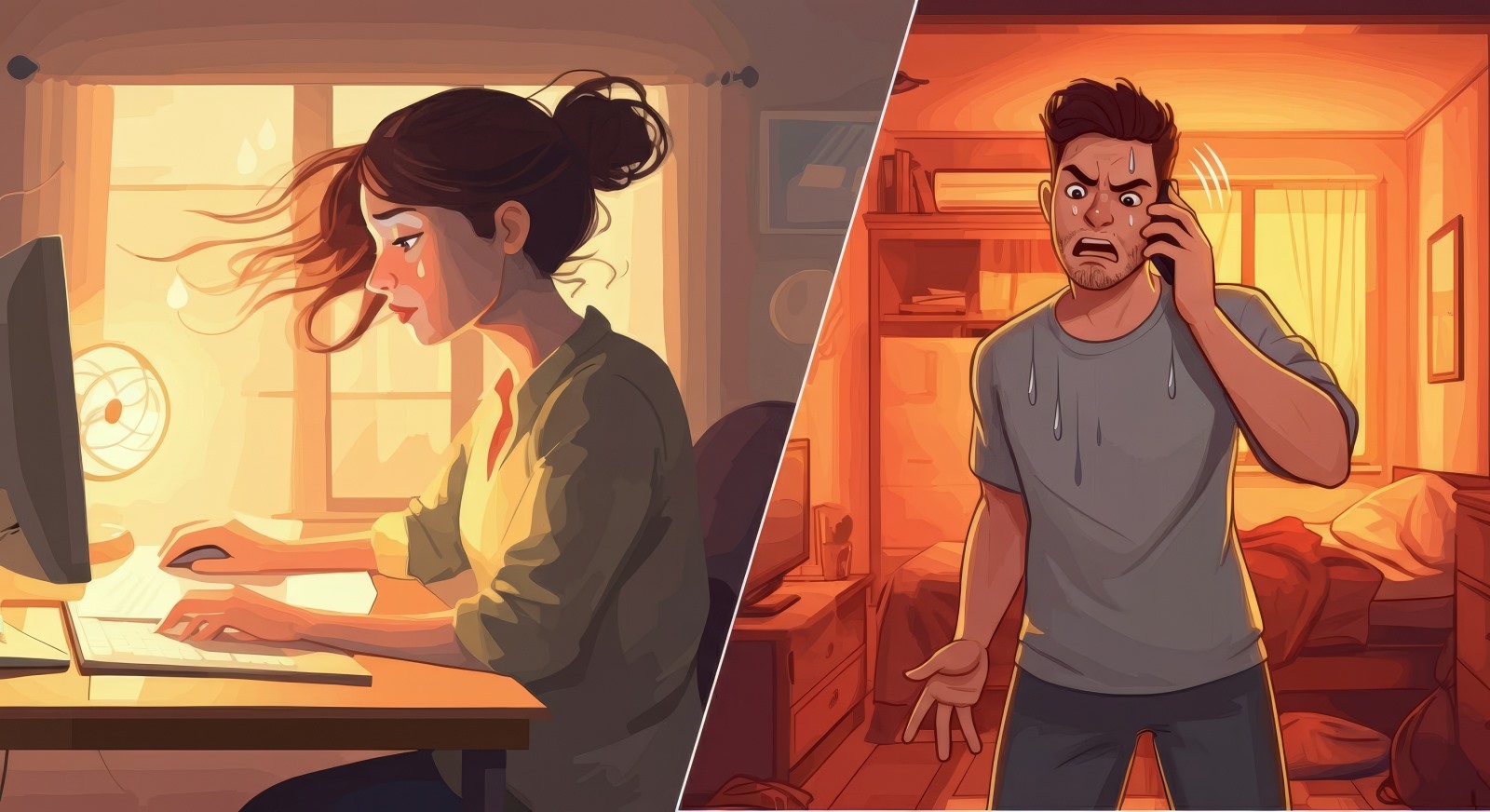What to Do When Your AC Breaks in a Lubbock Rental

When Your Air Conditioner Breaks: A Tale of Two Tenants and Your Rights as a Lubbock Renter
The mercury hits 98 degrees on a Tuesday in July, and two Lubbock renters—Sarah Martinez and Jason Thompson—both discover their air conditioners have stopped working. What happens next illustrates why understanding your lease and following proper procedures matters more than emotions when dealing with apartment repairs.
Sarah's Story: Following the Rules
Sarah comes home from work to find her apartment sweltering at 85 degrees. Her first instinct is frustration—who wouldn't be upset? But instead of immediately picking up the phone to vent to her landlord, she takes a different approach.
Step 1: She checks her lease. Sarah pulls out her Texas Apartment Association lease and flips to Paragraph 15: "Requests, Repairs and Malfunctions."1 She reads that all repair requests must be in writing and delivered to the designated representative. She notes that her lease specifically requires written requests for legal protection.
Step 2: She documents everything. Before writing anything, Sarah takes photos of her thermostat showing the temperature, notes the time and date, and documents that the AC unit isn't running at all.
Step 3: She writes a proper repair request. Following Texas law requirements, Sarah creates a written notice that includes:
-
The date
-
Her name and apartment address
-
A detailed description: "Air conditioning unit completely non-functional since approximately 2:00 PM on July 15th. Indoor temperature reached 85 degrees"
-
A statement that this affects her health and safety
-
A request for repair within 7 days (or sooner given the emergency nature)
Step 4: She sends it properly. Sarah emails the notice to her property management company as specified in her lease, but also sends a copy via certified mail, return receipt requested. She knows that using trackable delivery provides solid documentation.
Result: The property manager receives Sarah's professional, documented request and immediately recognizes this tenant knows her rights and has followed proper procedures. A repair technician is dispatched within 24 hours. Sarah has protected her legal position and demonstrated she's a responsible tenant who follows proper channels.
Jason's Story: The Emotional Approach
Jason discovers his broken AC around the same time as Sarah. But Jason's day was already stressful—he's behind on a work project, the engine light is on in his truck, and now this. His response is immediate and emotional.
Step 1: He calls and vents. Jason immediately calls the apartment office, reaches voicemail, and leaves an angry message: "My AC is broken and it's like an oven in here! This is ridiculous! You need to fix this right now!"
Step 2: He assumes and demands. When no one calls back within an hour, Jason becomes more frustrated. He texts his property manager: "Still waiting! This is unacceptable customer service!" He doesn't document the problem, take photos, or check what his lease requires.
Step 3: He threatens without following procedures. By evening, Jason fires off an emotional email: "If you don't fix my AC by tomorrow, I'm calling a repair company myself and deducting it from my rent! I know my rights!" He's actually wrong about his rights—the "repair and deduct" remedy in Texas has very strict requirements that he hasn't met.
Step 4: He escalates poorly. When the repair isn't completed within 24 hours (the property manager was waiting for an HVAC contractor who specializes in his unit's older system), Jason posts negative reviews online and complains to neighbors about the "terrible management."
Result: The property manager sees Jason as a difficult tenant who doesn't understand proper procedures. While the repair still gets done, Jason has damaged his relationship with management and potentially put himself at legal risk by threatening improper "self-help" remedies.
Why Sarah's Approach Works Better
Legal Protection: By following proper written notice procedures, Sarah has established her legal rights under Texas Property Code Sections 92.052 and 92.0561. If repairs hadn't been made, she could terminate her lease, sue for damages, or seek other legal remedies.
Professional Relationship: Sarah demonstrated respect for proper procedures, making management more likely to prioritize her requests and work with her on future issues.
Documentation: Her photos, written requests, and certified mail receipts create a clear paper trail that protects her if disputes arise.
Stress Reduction: By channeling her frustration into productive action, Sarah felt more in control and less helpless.
Why Jason's Approach Creates Problems
No Legal Standing: Without proper written notice following Texas law requirements, Jason has no legal recourse if repairs aren't made. His threats about "repair and deduct" could actually make him liable for penalties if he follows through improperly.
Damaged Relationships: His emotional outbursts and public complaints make property managers less likely to prioritize his needs or work with him on future issues.
Potential Consequences: His threats of self-help remedies could result in lease violations, fines, or even eviction proceedings if he follows through without meeting legal requirements.
Continued Stress: His emotional approach keeps him in a state of frustration and powerlessness instead of taking effective action.
Understanding Your Lease: Where to Look
Whether you have a Texas Apartment Association lease or a standard residential lease that many independent owners use, both contain similar important sections about repairs:
For TAA Apartment Leases:
-
Paragraph 15: "Requests, Repairs and Malfunctions" (typically pages 3–4)
-
Paragraph 15.1 requires all repair requests to be in writing
-
Paragraph 15.4 outlines your remedies if repairs aren't made, referencing Texas Property Code sections
For Residential Leases:
-
Look for the section titled "Repairs" or "Requests for Maintenance"2
-
Similar written notice requirements apply
-
Same Texas law protections for health and safety repairs
The Proper Repair Process for All Renters
-
Submit in Writing: Email or hand-deliver a dated, written description of the problem to your landlord or their representative. Keep a copy for your records.
-
Be Detailed: Say what is broken (example: "Air conditioner not cooling," "Heater not working," "Leak under kitchen sink"). Include when the problem started and why it matters to your comfort or health.
-
Follow Up: If you don't receive a response or the timeline for repair is unclear (or unreasonable), check your lease for the next steps.
-
Know Your Rights: If a repair "materially affects the health or safety" of a resident and isn't fixed in a reasonable time after you provided written notice, Texas law may give you rights such as:
-
Ending your lease early and moving out
-
Having repairs made and deducting the cost from your rent (but only after following exact legal procedures)
-
Seeking a court order for repairs
-
The Lesson for Lubbock Renters
When any repairs are needed—especially for essential systems like air conditioning during Texas summers—your emotional response is understandable but not helpful. What matters is following the specific procedures outlined in your lease and Texas law.
Your lease is your road-map—emotional responses without proper procedures lead nowhere. Professional, documented requests following legal requirements get results.
Important Reminders:
-
The Lubbock Apartment Association cannot intervene in individual repair disputes, provide legal advice, or contact landlords on your behalf
-
We cannot give out any private owner or management details
-
We strongly recommend you review your specific lease, know your rights, and use outside resources or legal counsel as needed
For additional guidance on rental issues, visit our Renter's Resources page for more information on tenant rights, dispute resolution, and helpful contacts.
Disclaimer: This information is for educational purposes only and does not constitute legal advice. In emergency situations involving immediate threats to health, safety, or housing security, contact appropriate authorities (911 for emergencies) and consider consulting with a qualified attorney immediately. The Lubbock Apartment Association cannot provide legal services, interpret individual leases, or intervene in repair disputes. The situations described as requiring legal help need individual legal assessment that only a licensed attorney can provide.
Frequently Asked Questions: When to Get Legal Help
When should I consider contacting an attorney about repair issues?
You should consult with an attorney immediately if:
-
Your landlord locks you out illegally or shuts off utilities as retaliation
-
You're facing discriminatory treatment based on race, gender, disability, or other protected characteristics
-
Your apartment has become uninhabitable due to serious health hazards like extensive mold, sewage backups, or structural damage
-
You're being threatened with eviction after requesting legitimate repairs (potential retaliation)
What constitutes an escalated repair situation requiring legal help?
Consider legal consultation when:
-
You've followed proper written notice procedures multiple times but repairs affecting health and safety remain unaddressed after 30+ days
-
Your landlord refuses to make repairs that violate city building or health codes
-
The repair issue is so severe it makes your apartment unlivable (no heat in winter, no air conditioning in extreme heat, major plumbing failures, electrical hazards)
-
You've attempted the repair-and-deduct process but your landlord is threatening eviction
What are signs of landlord retaliation that require legal help?
Seek legal help if your landlord retaliates by:
-
Filing eviction proceedings within 6 months of your repair request
-
Increasing your rent suddenly after you complained about conditions
-
Reducing services or denying you use of common areas
-
Threatening you or behaving in ways that interfere with your peaceful enjoyment
Where can I find legal help in Texas if I can't afford an attorney?
For income-qualified residents:
-
Legal Aid of Northwest Texas: Serves the Lubbock area and surrounding counties
-
Texas RioGrande Legal Aid: Serves low-income tenants statewide
-
State Bar of Texas Disaster Legal Services Hotline: 800-504-7030
General Resources:
-
Local bar association lawyer referral services (usually $20-50 for initial consultation)
-
Law school legal clinics with supervised student attorneys
-
Texas Legal Answers (texaslegalanswers.org): Free online legal advice platform
What should I do if I'm facing eviction after requesting repairs?
Don't wait to seek legal help if you're facing:
-
Any eviction notice you believe is retaliatory or improper
-
Conditions that are making you or your family physically ill
-
Landlord threats or intimidation after you've requested repairs
-
Situations where you feel unsafe in your own home
The cost of an attorney consultation is often much less than the potential consequences of not getting proper legal advice when facing eviction, retaliation, or serious health hazards.
Can I handle repair disputes in court without an attorney?
For certain situations, yes:
-
Justice of the Peace Courts: Handle "repair and remedy" cases up to $10,000 without requiring an attorney
-
Small claims court: For security deposit disputes and damages under $20,000
However, complex cases involving retaliation, discrimination, or serious health hazards typically require professional legal representation.
What's the difference between an emergency repair situation and a regular repair request?
Emergency situations requiring immediate attention and potential legal intervention include:
-
No heat during winter months
-
No air conditioning during extreme heat
-
Major plumbing failures causing flooding or sewage backup
-
Electrical hazards creating fire or electrocution risks
-
Broken locks or security devices compromising safety
-
Structural damage making the unit unsafe
Regular repairs can typically be handled through standard lease procedures and may not require legal intervention unless they remain unaddressed for extended periods.
